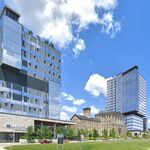What would you say is the most common term, third-gen immigrant or third-gen Canadian? Personally I've always used x-generation Canadian assuming they have citizenship (which they would for 2nd/3rd gen), but I haven't really paid attention to which term others use.
I actually don't think I hear third-gen immigrant all that much -- I just heard it a few times but thought it was odd. I think I do hear x-gen Canadian a lot though. Sometimes very often even just x-gen without anything after, like ..."I'm Italian/Chinese/Indian etc." "Oh, I am too, but I'm second/third-generation".
I would say this is true. Italian-Americanness has a lot of time separating it from its Italian origins, but Italian emigration to Canada is still relatively recent and more connected to Italy.
I wonder if there's any distinct culture or group considered analogous to Italian-Americans in this sense but for a particular homegrown culture in Canada. It seems like in most cases, for the same source country, many immigrant groups have a less distinctively homegrown identity in Canada than in the US. Perhaps Ukrainian-Canadians out west is an example?
That's also true for other western European groups like Germans and Dutch, especially in urban areas.
The exception being the religious Amish/Mennonite areas in rural Waterloo and Perth counties and in southeast Manitoba.
A lot of Dutch are very religious and socially conservative as well. But I don't think language is really part of it, even if a lot of the SW Ontario Dutch belong to evangelical churches.
Yeah, in general, it seems like many of the (non-official) European languages are barely being sustained or retained, probably owing to their lower share of the newer post-1960s immigrants. I wonder if there is even any European wave that is primarily still majority foreign-born, or which European group in North America is the latest/newest and retains the closest ties on average to the old country. In my childhood and teenage years I still remember many relatively newly arrived classmates from the Balkans area, including the former Yugoslavia, so I think that might be. The pendulum has now swung towards Europe now itself being a destination rather than source of immigrants, as the news will attest to. I also think the formation of the EU has made European emigration to our side of the Atlantic slow to a trickle as Europeans move among themselves. For instance, many Polish people recently immigrated to the UK in sizeable numbers.
Returning to the OP, one thing I'll say is it's pretty hard to generalize about "American cities" - there's just too much variety.
You have NYC where the "melting pot" has never really applied and has long been multicultural and now has people from all over the globe. You have Los Angeles, which was mostly made up of Midwestern white Protestants until about 1970 but then became one of the most diverse cities in the world with a big influx of Mexican and Asian immigrants. You have Miami which demographically looks like Latin America and the Caribbean with a bit of NYC thrown in. There are the "rust belt" cities, like Cleveland and Pittsburgh, that attracted a lot of European immigrants a century ago but have long ceased to be centers of immigration. Or fast-growing Southern cities like Atlanta and Houston that historically had low foreign born populations and have only become more diverse in recent decades.
There's some pockets of diversity in unlikely places: the Arab population of Dearborn, Hmong and Somalis in Minnesota, Tibetans and Burmese in Utica, Bosnians in St. Louis etc.
That's true. I do think though that one big difference between the US and Canada is (looking specifically at non-European groups) we don't have a long-standing visible minority group comparable to African-Americans in the US, that is primarily not majority foreign-born and that is dominant in our cities and public consciousness (Aboriginal Canadians would be the only example, but they make up a small percentage of the largest Canadian cities). Even many Latino Americans (Mexicans and Mexican-Americans, Puerto Ricans) have long-standing ties to American history more broadly in the 20th century and earlier. You mentioned African immigrants assimilating to African American culture in New York city earlier in the thread, but in Canada there isn't really an analogous scenario -- our newer waves of immigrant that dominate our cities aren't as shaped by pre-1960s experiences. It seems like a Somali-Canadian or Tamil Canadian might end up being the first visible minority in their part of town or arrive with others close to the same time, while a Cameroonian or Hmong American might find their neighbourhood already has a history of complex race or ethnic relations with African-Americans, Latinos etc. I feel a more complex "pre-existing" history of race relations in many US cities than Canadians seem used to.
I find in Canada, when people say diversity/visible minority in many cities (Toronto, Vancouver, Calgary etc.), they often will conflate the concept with "new Canadians" or immigrants. I think this is one way we might be more similar to Australia, another new immigrant country, than the US.
There are many Chinese restaurants throughout small Canadian cities, many of which sell dishes considered exotic to those who live in China.
The fortune cookie, which is found in many Chinese restaurants, was invented by a Japanese restaurateur in San Francisco and is only recently available in China.
Sweet-and-sour pork is usually fried in North America, but rarely fried in China.
Some Chinese restaurants in North America, especially in the Deep South, sell Southern fried chicken rather than crispy fried chicken.
I wonder if it is a culture shock for older generations of Chinese-Canadians (such as those in small towns) to meet together and talk with newly arrived Chinese immigrants or maybe actual Chinese people from China, such as the large number who come to study at Canadian universities.




